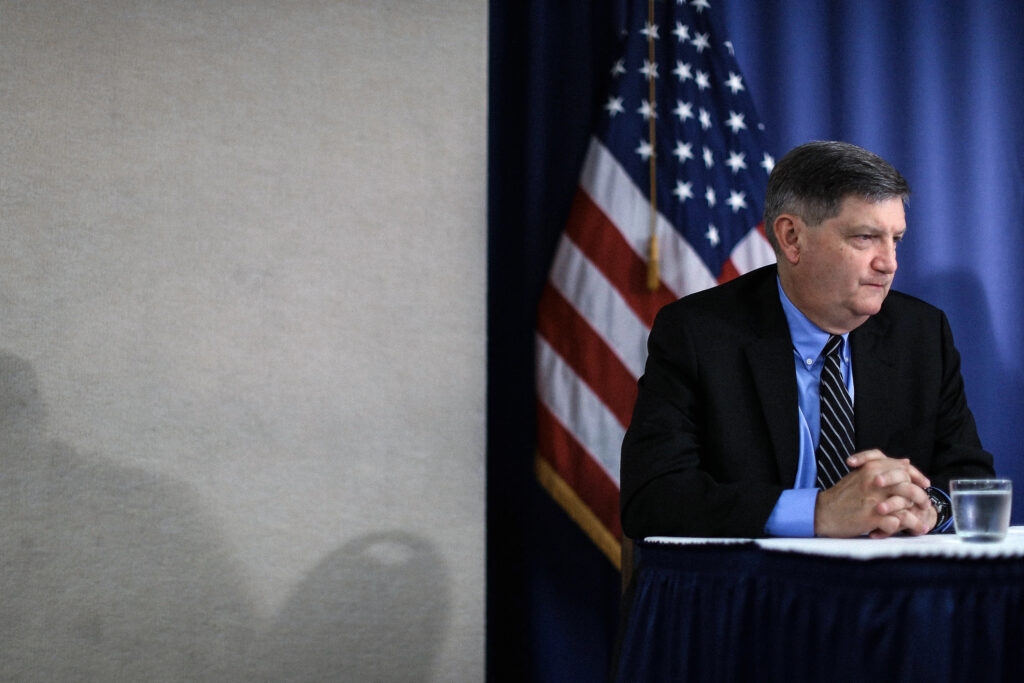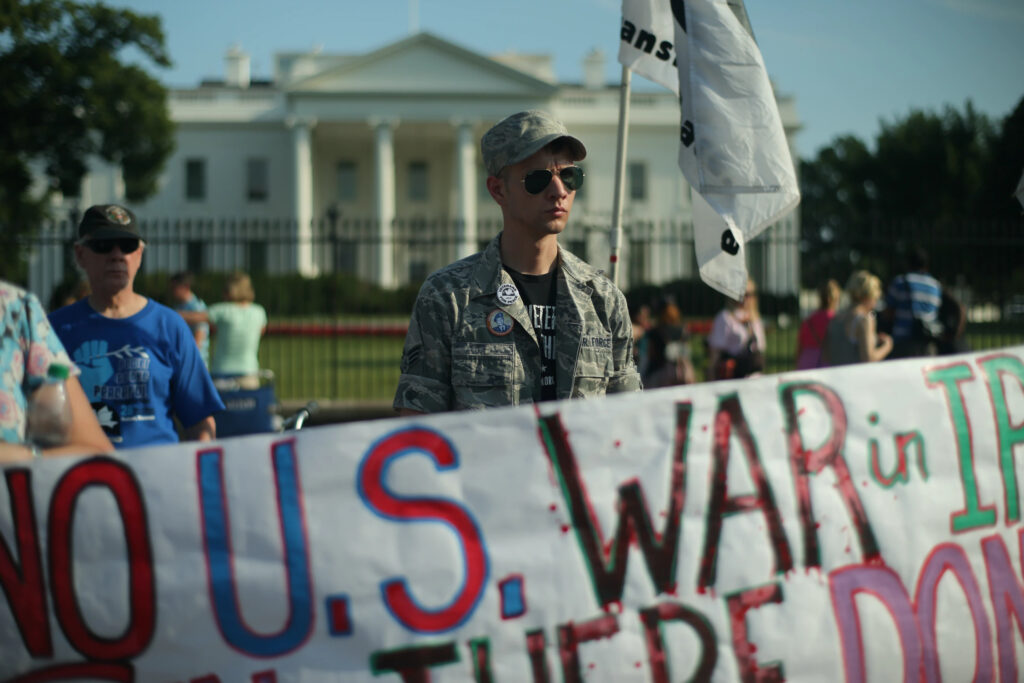The Journalist and the Whistleblower
MEDIA, 19 Apr 2021
James Risen | The Intercept - TRANSCEND Media Service
As the government attacks press freedom, reporters must consider their responsibility to sources — and each other.

James Risen participates in a news conference where press freedom advocates speak about the Justice Department’s pursuit of Risen’s confidential sources at the National Press Club in Washington, D.C., on Aug. 14, 2014.
Photo: Chip Somodevilla/Getty Images
13 Apr 2021 – When I became a reporter, I was surprised to discover a trait that I had never before recognized in myself.
People liked to talk to me. They liked to talk to me so much that they often revealed things they weren’t supposed to share. They did so voluntarily.
I noticed this when I was 23 and working in my first job as a reporter at the Journal Gazette in Fort Wayne, Indiana. One day, I was meeting with the director of the Fort Wayne Chamber of Commerce, the most pro-business man in town, when he suddenly told me to get into his car and drove me to a factory with no signs or exterior identification. He explained that the building I was looking at was the secret plant of a company trying to hide from regulators and labor unions. A few months later, I was standing in a large crowd of reporters covering a strike at International Harvester, then Fort Wayne’s largest employer, when someone who worked there walked up to me and whispered that I should follow him. When we got to his car, he opened the trunk to reveal boxloads of secret International Harvester documents — and told me to take all of them.
Things like that have continued to happen throughout my career, and I’ve been surprised every time. While I was working on a book about the anti-abortion movement, Joseph Scheidler, one of the nation’s leading anti-abortion extremists, gave me the keys to his Chicago office and told my co-author and me that we could spend an entire weekend going through his personal files by ourselves, with no one else around. We found lots of documents that made him look bad, and I never understood why he let us do it.
I’ve always thought of this strange capability as a trait rather than a skill, because I don’t recall ever doing anything to make it happen. In most fields, such a trait would be modestly helpful. But for an investigative reporter, it is all-important.
Yet for today’s investigative reporters, particularly in the field of national security reporting, being good at getting people to talk can seem like a curse.
In the 21st century, hatred of the press has become bipartisan, and government leak investigations under both Republican and Democratic administrations have altered the landscape for national security reporting. Starting with the George W. Bush administration in the years after 9/11, the federal government has brought criminal charges in nearly 20 cases related to leaks to the press, virtually all of them involving national security matters. In almost all of those cases, it is the sources who have faced criminal charges, not the reporters who published what the sources told them.
The fate of modern investigative reporting is now on a collision course with high-tech government leak investigations.
As a result, the fate of modern investigative reporting is now on a collision course with high-tech government leak investigations. Being really good at getting people to tell you government secrets — the key to career success as a national security reporter — now brings great danger to a reporter’s sources.
The arrest and prosecution of a source can lead to a silent sense of guilt and shame. Silent because the reporter cannot publicly acknowledge the source for fear of confirming the government’s case; guilt and shame because the reporter’s news organization rarely does anything to help a source facing federal prosecution. At major newspapers and television networks, there is an unspoken gulf between the reporter, who has a personal relationship with the source, and top managers, who don’t.
The Department of Justice and the FBI consistently exploit this guilt and shame by pointing out, in official court documents in virtually every leak case, the supposed mistakes reporters have made that government agents claim somehow helped them identify the sources of information.
The truth is that the federal government doesn’t need a reporter to make a mistake in order to track down a whistleblower. The government has immense surveillance powers, and those powers are at their most robust when it comes to tracking someone with a security clearance and access to classified information.
Most people who go to work for the government, or even for a government contractor, have only a vague understanding of how much of their privacy and civil rights they are signing away when they get a security clearance. Once the government launches a leak investigation, there are few limits on its ability to track the digital footprint of a suspect working in the national security apparatus.
Most reporters think hard and work tirelessly to protect confidential sources and now widely use encrypted electronic communications. But government leak hunters have the National Security Agency on their side, and reporters don’t.
Government leak hunters have the National Security Agency on their side, and reporters don’t.
Yet arresting and prosecuting a source isn’t enough for the Justice Department and the FBI; they also want to make the reporter look bad. That underscores the real goal of leak investigations: They are designed to have a chilling effect on the press, to stop reporters from investigating the government. Embarrass enough investigative reporters and maybe they will stop embarrassing the government.
To their disgrace, the rest of the media often plays along with this governmental shaming project. Rather than recognizing that a source is a whistleblower performing a public service, the press invariably buys into the FBI’s propaganda that the bureau’s agents are investigating a crime and tracking down a traitor.
Press coverage of leak investigations and prosecutions follows a depressingly predictable narrative arc. The whistleblower who is a source for a story is depicted as a criminal who has been cornered and arrested by the heroic FBI, while the investigative reporter who broke the story is described as an accessory to a crime. The press unquestioningly plays up any supposed evidence presented by the government that the reporter made mistakes that were somehow the reason for the whistleblower’s arrest and prosecution.
This professional censure, along with the constant anxiety of knowing that the government is using all its vast power to locate sources, has led many investigative reporters into a period of second-guessing and introspection. Should a reporter who has the natural gift of getting people to tell them secrets keep using that gift if it can put people in prison?
The argument to continue reporting is powerful. Almost everything we know about the conduct of our 20-year forever wars has been made public thanks to aggressive national security reporting. People forget that something as basic as the very existence of the armed Predator drone was classified until legendary journalist Sy Hersh reported that it was being used to kill people in Afghanistan.
Unfortunately, the government’s leak crackdown has made the counterargument — not to keep developing sources and uncovering secrets for fear of putting people at risk — compelling as well. For national security reporters today, being good at your job can make it hard to sleep at night.
I have been thinking a lot about this dilemma recently because of several new developments in the government’s war over leaks.
In January, in the closing days of Donald Trump’s presidency, there was a campaign to convince Trump to pardon WikiLeaks founder Julian Assange. That campaign failed; hopeful Assange supporters seemed to ignore the fact that it was the Trump administration that had indicted Assange in the first place.
That was followed by a decision in February by the incoming Biden administration to appeal a ruling by a British court rejecting Assange’s extradition to the United States. For now, Assange remains imprisoned in Britain, but if the Biden administration follows through with his prosecution, it would once again underscore the bipartisan nature of the government’s crackdown on the press.
The Assange case is particularly troubling because the charges focus on the interactions between Assange and Chelsea Manning, the source of the U.S. military and diplomatic documents that WikiLeaks published a decade ago. If successful, the Assange prosecution could lead the government to prosecute investigative journalists based on the means by which they seek to obtain information from their sources.
In March, meanwhile, Daniel Hale, a former intelligence analyst, pleaded guilty in federal court to disclosing classified information about U.S. drone warfare programs. Arrested in 2019, Hale has been hounded by the government because he helped reveal the truth about the vicious and secretive processes used by the United States to target and kill people around the world with drone strikes.
In addition, a new documentary film was recently released about Reality Winner, a whistleblower who was arrested after revealing classified information showing that Russian intelligence sought to hack into U.S. voting systems during the 2016 presidential election. Her disclosure showed that the U.S. intelligence community knew about the Russian hacking attempts but had not warned the American people or even state election officials. Its significance was detailed in a 2018 Senate report, which revealed that state election officials learned of the Russian hacking threat from press coverage, not the federal government. The Senate report was issued even as the Justice Department was prosecuting Winner for sharing the information.
The common thread between Hale and Winner is that both were widely reported to have been sources for stories published by The Intercept.
Sonia Kennebeck’s documentary, “United States vs. Reality Winner,” is a heartbreaking tale of the pain and loss Winner and her family suffered following her arrest and subsequent court hearings and time in prison, where she remains today after pleading guilty to leaking classified information in 2018.
The centerpiece of the film is a recording of the FBI’s initial, intimidating interview with Winner. FBI agents crowd into her small home in Augusta, Georgia, surrounding and badgering her until she confesses, without ever making it clear that she has every right to leave and get a lawyer.
“If nothing is off limits … what prevents character assassination and blackmail? How can individuals stand up to the might of such an omniscient state?”
The documentary also chronicles how every keystroke Winner has ever made on any digital platform is turned into evidence against her: emails, tweets, private messages to her sister. “To see the vast surveillance machine spit out fragments of private online conversations that are indefinitely stored even after users delete them confirms the concerns of journalists and privacy advocates,” Kennebeck wrote in a director’s letter accompanying the film. “If nothing is off limits — not even silly messages exchanged between sisters, or personal journal entries written in anguish — what prevents character assassination and blackmail? How can individuals stand up to the might of such an omniscient state?”
Winner has acknowledged that she anonymously sent an NSA document about the Russian hacking efforts to a news outlet, identified in press reports as The Intercept, which published a story about it in 2017. (The Press Freedom Defense Fund, a program of First Look Institute, of which I am the director, paid Winner’s legal fees. First Look Institute is also The Intercept’s publisher.)
The Intercept has been heavily criticized for mistakes in its reporting on the document, which it received anonymously, mistakes that critics say helped identify its source. Kennebeck’s film highlights The Intercept’s mistakes as well. Yet her director’s letter includes an observation that dovetails with my own thinking: “In all the human imperfection of Winner’s leak and The Intercept’s serious failures in protecting her as a source, what whistleblowers and journalists are facing is an overwhelming adversary: The United States government with its unlimited resources and surveillance capabilities. With few constitutional restraints and aided by the Espionage Act, a draconian century-old law, prosecutors seem to have the upper hand.”
This brings me back to the dilemma facing investigative reporters today. Is it morally right to keep reporting and to continue developing sources in a climate in which the dangers are so clear? Should American investigative reporters step back from their work because of the risks to sources?
I have privately struggled with this question for years. I’ve concluded that the only solution is for investigative reporters to keep working and keep developing sources, because American democracy demands it.
At the same time, investigative reporters must be completely honest with their sources about the risks they face. A reporter who consciously betrays a source will not last long. In fact, I’ve found that being honest with sources is the only way to get them to talk. It is also the only way I can live with myself.
As the threat from leak investigations has increased, I’ve tried to be even more brutally honest with sources than before. I’ve sometimes told sources who want to provide me with sensitive information to go home and think about the risks first. In some cases, I have also told sources that I will not publish anything based on the information they’ve provided because I judged the story not significant enough to justify the risks to the source. In my work as an investigative reporter, I’ve made many mistakes. I often recount these to potential sources so they know what they’re getting into when they talk to me.
The astonishing thing is that being open and honest with sources about the potential risks actually makes them even more willing to talk. Telling them the truth makes them want to tell the truth.
And that leads the investigative reporter back to square one: What to do about this gift for getting people to talk?
Keep using it for the good of journalism, and the good of the country and the world. But if investigative reporters are to continue working in this nightmarish environment, I believe that one thing must change. The rest of the media must stop enabling the Justice Department and the FBI. The press must stop covering leak investigations like bank robberies and start covering them for what they really are: threats to press freedom.
________________________________________________-
 Jim Risen, a best-selling author and former New York Times reporter, is The Intercept’s Senior National Security Correspondent, based in Washington, D.C. Risen also serves as director of First Look Media’s Press Freedom Defense Fund, which is dedicated to supporting news organizations, journalists, and whistleblowers in legal fights in which a substantial public interest, freedom of the press, or related human or civil right is at stake. Risen was himself a target of the U.S. government’s crackdown on journalists and whistleblowers. He waged a seven-year battle, risking jail, after the Bush administration and later the Obama administration sought to force him to testify and reveal his confidential sources in a leak investigation. Risen never gave in, and the government finally backed down. As a New York Times reporter, Risen won the 2006 Pulitzer Prize for National Reporting for his stories about the National Security Agency’s domestic spying program, and he was a member of the reporting team that won the 2002 Pulitzer Prize for explanatory reporting for coverage of the September 11 attacks and terrorism.
Jim Risen, a best-selling author and former New York Times reporter, is The Intercept’s Senior National Security Correspondent, based in Washington, D.C. Risen also serves as director of First Look Media’s Press Freedom Defense Fund, which is dedicated to supporting news organizations, journalists, and whistleblowers in legal fights in which a substantial public interest, freedom of the press, or related human or civil right is at stake. Risen was himself a target of the U.S. government’s crackdown on journalists and whistleblowers. He waged a seven-year battle, risking jail, after the Bush administration and later the Obama administration sought to force him to testify and reveal his confidential sources in a leak investigation. Risen never gave in, and the government finally backed down. As a New York Times reporter, Risen won the 2006 Pulitzer Prize for National Reporting for his stories about the National Security Agency’s domestic spying program, and he was a member of the reporting team that won the 2002 Pulitzer Prize for explanatory reporting for coverage of the September 11 attacks and terrorism.
Tags: Freedom of the press, Investigative Journalism, Journalism, Media, Truth, War Journalism, Whistleblowing
DISCLAIMER: The statements, views and opinions expressed in pieces republished here are solely those of the authors and do not necessarily represent those of TMS. In accordance with title 17 U.S.C. section 107, this material is distributed without profit to those who have expressed a prior interest in receiving the included information for research and educational purposes. TMS has no affiliation whatsoever with the originator of this article nor is TMS endorsed or sponsored by the originator. “GO TO ORIGINAL” links are provided as a convenience to our readers and allow for verification of authenticity. However, as originating pages are often updated by their originating host sites, the versions posted may not match the versions our readers view when clicking the “GO TO ORIGINAL” links. This site contains copyrighted material the use of which has not always been specifically authorized by the copyright owner. We are making such material available in our efforts to advance understanding of environmental, political, human rights, economic, democracy, scientific, and social justice issues, etc. We believe this constitutes a ‘fair use’ of any such copyrighted material as provided for in section 107 of the US Copyright Law. In accordance with Title 17 U.S.C. Section 107, the material on this site is distributed without profit to those who have expressed a prior interest in receiving the included information for research and educational purposes. For more information go to: http://www.law.cornell.edu/uscode/17/107.shtml. If you wish to use copyrighted material from this site for purposes of your own that go beyond ‘fair use’, you must obtain permission from the copyright owner.

